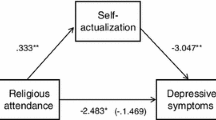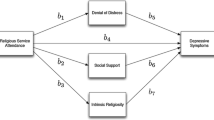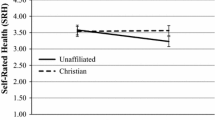Abstract
A stratified randomized sample of 525 middle age (35–64 years old) men was used to study the relationships between self-reported level of church attendance (CA), self-reported religious faith (SRRF), religious well-being (RWB), existential well-being (EWB), self-actualization (SA), health, lifestyle, and participation in physical activity (PA). Religious measures (RWB, CA, and SRRF) were found to be dependent on psychosocial variables in terms of their relationships with PA, lifestyle, and health. On the other hand, psychosocial resourcefulness (SA, EWB, social support, and stress management) showed independent relationships with lifestyle, PA, and health. These findings indicate that the positive associations of psychological and sociological constructs with health are not related to or dependent upon ego syntonic religious identity.


Similar content being viewed by others
References
Berkman, L., & Syme, S. (1979). Social networks, host resistance, and mortality: A nine year follow-up study of Alameda Country residents. American Journal of Epidemiology, 109, 186–204.
Bjurstrom, L. A., & Alexiou, N. G. (1978). A Program of heart disease intervention for public employees: A five year report. Journal of Occupational Medicine, 20(8), 521–531.
Bufford, R. K., Paloutzian, R. F., & Ellison, C. W. (1991). Norms for the spiritual well-being scale. Journal of Psychology and Theology, 19(1), 56–70.
Chandler, H. M., Alexander, C. N., & Heaton, D. P. (2005). The transcendental meditation program and postconventional self-development: A 10-year longitudinal study. Journal of Social Behavior and Personality, 17, 93–121.
Edmondson, K. A., Lawler, K. A., Jobe, R. L., Younger, J. W., Piferi, R. L., & Jones, W. H. (2005). Spirituality predicts health and cardiovascular responses to stress in young adult women. Journal of Religion and Health, 44(2), 161–171.
Ellison, C. W. (1983). Spiritual well-being: conceptualization and measurement. Journal of Psychology and Theology, 11(4), 330–340.
Ellison, C. G. (1991). Religious involvement and subjective well-being. Journal of Health and Social Behavior, 32, 80–99.
Ellison, C. W., & Smith, J. (1991). Towards and integrative measure of health and well-being. Journal of Psychology and Theology, 19(1), 35–48.
Geller, L. (1982). The failure of self-actualization theory: A critique of Carl Rogers and Abraham Maslow. Journal of Humanistic Psychology, 22, 56–73.
Geller, L. (1984). Another look at self-actualization. Journal of Humanistic Psychology, 24, 93–106.
George, L. K., Ellison, C. G., & Larson, D. B. (2002). Explaining the relationship between religious involvement and health. Psychological Inquiry, 13(3), 190–200.
George, L. K., Larson, D. B., Koenig, H. G., & McCullough, M. E. (2000). Spirituality and health: What we know, what we need to know. Journal of Social and Clinical Psychology, 19(2), 102–116.
Hill, P. C., & Hood, R. W. (1999). Measures of religiosity. Birmingham: Religious Education Press.
Jensen, L., Newall, R. J., & Holman, T. (1990). Sexual behaviour, church attendance, and permissive beliefs among unmarried young men and women. Journal of Scientific Study of religion, 29, 113–117.
Kobasa, S. C., Maddi, S. R., & Courington, S. (1981). Personality and constitution as mediators in the stress-illness relationship. Journal of Health and Social Behavior, 22, 368–378.
Koenig, H. G., McCullough, M. E., & Larson, D. B. (2001). Handbook of religion and health. Oxford: Oxford University press.
Lawler, K. A., & Young, J. W. (2002). Theobiology: An analysis of sprirituality; cardiovascular responses, stress, mood, and physical health. Journal of Religion and Health, 41(4), 347–362.
Maslow, A. H. (1970). Religions, values, and peak-experiences. New York: Penguin Books USA, Inc.
Maslow, A. H. (1987). Motivation and personality. New York: Addison-Wesley Educational Publishers, Inc.
McCullough, M. E., Hoyt, W. T., Larson, D. B., Koenig, H. G., & Thoresen, C. (2000). Religious involvement and mortality: A meta-analytic review. Health Psychology, 19(3), 211–222.
Miller, W. R., & Thoresen, C. E. (2003). Spirituality, religion and health. American Psychologist, 58(1), 24–35.
Oleckno, W. A., & Blacconiere, M. J. (1991). Relationship of religiosity to wellness and other health-related behaviors and outcomes. Psychological Reports, 68, 819–826.
Pargament, K. I. (1997). The psychology of religion and coping. New York: Guilford Press.
Powell, L. H., Shahabi, L., & Thoresen, C. E. (2003). Religion and spirituality: Linkages to physical health. American Psychologist, 58(1), 36–52.
Schroeder, D. H., & Costa, P. T. (1984). Influence of life event stress on physical illness: substantive effects or methodological flaws. Journal of Personality and Social Psychology, 46, 853–863.
Seeman, T. E., Dubin, L. F., & Seeman, M. (2003). Religiosity/Spirituality and health: A critical review of the evidence of biological pathways. American Psychologist, 58, 53–63.
Sharkey, B. J. (1984). Physiology of fitness. Champaign, IL: Human Kinetics.
Van der Merwe, S. (1997). The relationship between physical activity and spiritual well-being with lifestyle and health. Potchefstroom (Unpublished PhD-thesis—PU for CHE).
Walker, S. N., Sechrist, K. R., & Pender, N. J. (1987). The health promoting lifestyle profile: development and psychometric characteristics. Nursing Research, 36(2), 76–78.
Wyler, A. R., Masuda, M., & Holmes, T. H. (1968). Seriousness of illness rating scale. Journal of Psychosomatic Research, 11, 363–374.
Author information
Authors and Affiliations
Corresponding author
Rights and permissions
About this article
Cite this article
Dreyer, L.I., Dreyer, S. Religious Involvement, Psychosocial Resourcefulness, and Health. J Relig Health 51, 1172–1187 (2012). https://doi.org/10.1007/s10943-010-9423-y
Published:
Issue Date:
DOI: https://doi.org/10.1007/s10943-010-9423-y




